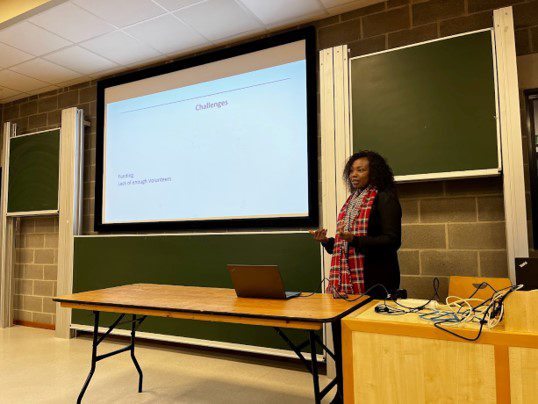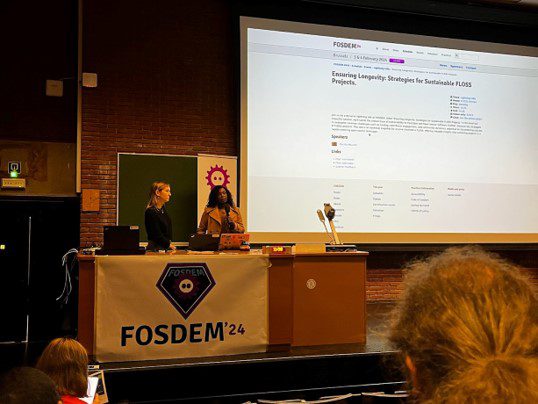The Open-Source Sustainability Symposium 2024, organized by Internews in Brussels, Belgium, was a vibrant confluence of individuals and organizations dedicated to the sustainability of open-source projects. As the digital landscape continues to evolve rapidly, the importance of sustainability in maintaining the longevity and effectiveness of open-source initiatives becomes increasingly apparent.
With a focus on empowering communities and creating actionable plans for sustainability, the symposium provided a platform for sharing insights, experiences, and innovative approaches.


The Internews Open Source Sustainability Symposium, held in February 2024 in Brussels, Belgium
Showcasing Innovation through Collaboration
One of the symposium’s highlights was the introduction of the Tella ecosystem, a testament to the power of collaborative innovation in the open-source space. Developed as a tool for Human Rights Defenders and journalists, Tella addresses the critical need for secure data collection in high-risk environments. The discussion around Tella wasn’t just about its features; it delved into how open-source tools can enhance each other’s capabilities, as evidenced by Tella’s seamless integration with Huridocs’ Uwazi platform. This synergy between tools exemplifies the symposium’s ethos of collaborative progress, showcasing how combining strengths can lead to more robust solutions.
The dialogue around Tella expanded into a broader conversation about sustainable development within the open-source community. The nuanced discussions on organizational structures, user feedback, and the balancing act between technology advancement and ethical responsibility enriched the symposium’s narrative, painting a picture of a community eager to evolve and adapt.
Empowering Journalism and Human Rights
The symposium also focused on the tangible impact of open-source tools in the field of journalism and human rights. The sessions underscored the importance of equipping frontline defenders with practical skills and tools that adhere to the highest security standards, such as the NIST’s CIA triad of Confidentiality, Integrity, and Availability.
However, the discussions didn’t stop at tool functionality; they tackled the larger issue of combating misinformation and disinformation in the digital age. This acknowledgment of the challenges faced by media initiatives highlighted the need for open-source tools that are not only technologically sound but also trustworthy and reliable. The discussion of tools like Tella in remote areas, such as rural Kenya, and the importance of reliability and compatibility, painted a vivid picture of the challenges and opportunities in harnessing open-source solutions for social impact.
The Power of Volunteerism in Open Source
The spirit of volunteerism within the open-source community was a central theme, with the Tor Project serving as a prime example. The narrative around Tor’s extensive volunteer network was a testament to the collective commitment to privacy, freedom online, inclusivity and innovation. The discussions acknowledged the challenges in engaging and retaining a motivated volunteer base and emphasized the need for innovative approaches to lower participation barriers and create vibrant ecosystems.
Initiatives like Tor Snowflake were spotlighted as key in fostering impactful community engagement, demonstrating the potential for inclusivity and innovation to propel the open-source movement. Despite the complexities involved in building a sustained and engaged community, the narrative remained positive, focusing on the community-driven innovation that can surmount these challenges, ensuring the movement’s dynamism and dedication to its core causes.
Navigating Ethical Data Practices
The symposium didn’t steer clear of the tough conversations, especially when it came to ethical data collection and privacy preservation. The discourse on responsible data practices, user consent, and the potential risks of data misuse brought to light the ethical quandaries inherent in the digital age. The exploration of tools like Clean Insights, which advocate for an ethical approach to data collection, underscored the open-source community’s commitment to privacy and integrity.
The transition of projects like F-Droid towards more ethical data practices underscores a broader movement within the open-source community, emphasizing a principled approach to technology development. This shift highlights the symposium’s overarching themes of sustainability and responsibility, setting new standards for user privacy, ethical data handling, and how open-source initiatives approach data collection and analytics.
Redefining Open-Source Sustainability
The symposium culminated in a forward-looking discussion on redefining what sustainability means for open-source projects. Beyond financial viability, the conversation explored the importance of community engagement, recognizing diverse contributions, and understanding the needs and motivations of the user base.
This holistic approach to sustainability emphasizes the need for open-source projects to not only be technologically advanced but also deeply connected to the communities they serve. By fostering a culture of collaboration, inclusivity, and ethical stewardship, the open-source movement can continue to thrive and make a meaningful impact.
What Next?
The Open-Source Sustainability Symposium by Internews was a testament to the power of collaboration, innovation, and community engagement in promoting sustainability in open-source projects. From showcasing innovative tools to discussing ethical data collection and privacy preservation, the symposium provided valuable insights and inspiration for attendees.
As we look to the future, it is clear that the sustainability of open-source initiatives depends on the collective efforts of individuals, organizations, and communities working together towards a common goal. By embracing the principles of transparency, inclusivity, and collaboration, we can build a more sustainable and resilient future for open-source projects worldwide.